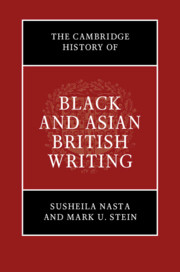Book contents
- The Cambridge History of Black and Asian British Writing
- The Cambridge History of Black and Asian British Writing
- Copyright page
- Dedication
- Contents
- Notes on Contributors
- Preface and Acknowledgements
- Introduction
- Part I New Formations
- Part II Uneven Histories
- (I) Global Locals
- (II) Disappointed Citizens
- 12 Looking Back, Looking Forward
- 13 Double Displacements, Diasporic Attachments
- 14 Wide-Angled Modernities and Alternative Metropolitan Imaginaries
- 15 Forging Collective Identities
- 16 Breaking New Ground
- 17 The Lure of Postwar London
- 18 Looking Beyond, Shifting the Gaze
- (III) Here to Stay
- Part III Writing the Contemporary
- Select Bibliography
- Index
12 - Looking Back, Looking Forward
Revisiting the Windrush Myth
from (II) - Disappointed Citizens
Published online by Cambridge University Press: 19 December 2019
- The Cambridge History of Black and Asian British Writing
- The Cambridge History of Black and Asian British Writing
- Copyright page
- Dedication
- Contents
- Notes on Contributors
- Preface and Acknowledgements
- Introduction
- Part I New Formations
- Part II Uneven Histories
- (I) Global Locals
- (II) Disappointed Citizens
- 12 Looking Back, Looking Forward
- 13 Double Displacements, Diasporic Attachments
- 14 Wide-Angled Modernities and Alternative Metropolitan Imaginaries
- 15 Forging Collective Identities
- 16 Breaking New Ground
- 17 The Lure of Postwar London
- 18 Looking Beyond, Shifting the Gaze
- (III) Here to Stay
- Part III Writing the Contemporary
- Select Bibliography
- Index
Summary
This chapter offers a critical overview of historical, cultural, and literary debates around ‘Windrush’. It revisits how the boat’s arrival in 1948 has come to represent the ‘beginnings’ of multicultural Britain and the consequent reshaping of the nation’s identity. It examines which factors influenced the writers and works that came to prominence and gained an enduring currency as Windrush narratives; it also attends to works that have been less celebrated. The particular focus of the chapter is on how the construction of the Windrush experience within literary works has aligned with wider political narratives to emphasise the ongoing challenges around the recognition and accommodation of black subjects within British culture and society. The chapter addresses two important blind spots within the literary framing of the Windrush experience: writings that emphasise transnational attachments and cultural mobility, as well as writings by women.
- Type
- Chapter
- Information
- The Cambridge History of Black and Asian British Writing , pp. 195 - 211Publisher: Cambridge University PressPrint publication year: 2020

